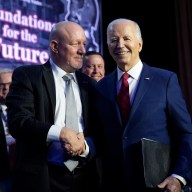OTTAWA – Prime Minister Stephen Harper has one crucial mission when he meets Barack Obama for the first time Thursday – convince him that America’s economic future is irrevocably linked with Canada’s.
With the U.S. heading toward the worst slump since the Great Depression, the rookie president is under intense domestic pressure to put America first, as the recent inclusion of protectionist language in the US$800-billion stimulus package attests.
Business leaders and economists say it’s essential that Harper impress on Obama the importance of maintaining open borders and liberalized trade between the two countries, particularly during the current economic crisis.
“It would be marvellous if there were a joint declaration by both Obama and Harper saying they resolutely reject protectionism,” said Thomas d’Aquino, head of the association representing Canada’s largest corporations.
“It’s not only good for Canada and the U.S., it would be a signal to the world that the two countries that are most heavily inter-dependent on trade feel strongly on this.”
D’Aquino noted that although the U.S. law commits to respecting international trade commitments, including those under NAFTA, it is questionable whether the language would forbid spending at the state level from being directed solely to domestic suppliers.
Although Canada enjoys a healthy trade surplus with the U.S., d’Aquino says the key point to make – and one to which Americans often give short shrift – is that Canada is America’s top export market, and largest supplier of energy.
As well, a majority of the roughly $560 billion in two-way trade between the countries is composed of inter-company shipments between Canadian affiliates and their state-side parent firms, so any disruption would hurt both countries.
That’s particularly true of the auto sector, which is likely to be a key topic of discussion between the two leaders.
Ottawa and Ontario have offered to contribute their share – currently pegged at about $4 billion – in a multi-billion bailout of General Motors Corp. and Chrysler LLC, which have until Friday to submit plans for restructuring. Deadlines are also approaching in the U.S.
When talks began in Washington last fall on a rescue plan for the Detroit Big Three, Economist Dale Orr of IHS-Global Insight says Canada’s roughly 20 per cent share of the industry did not even come up – a glaring and telling omission for such an integrated industry.
Orr said Thursday’s meeting is a good opportunity for Harper to seek assurances that the auto sector will be restructured in such a way that Canada retains its share of production and jobs.
Former Conservative trade minister David Emerson recently called on Canada and the U.S. to further integrate their economies by establishing a customs union to set common tariffs and duties.
However, Orr and others believe it would be a hard, if not impossible, sell in the United States, especially at a time of growing apprehension about economic sovereignty issues. He added that Harper may get more out of Obama if he shows Canada is ready to open the border on U.S. priority areas, such as relaxing high tariffs and quotas on dairy imports.
“The best thing we can hope is Obama says, ‘Yes, I support free trade, and the dairy farmers of Wisconsin tell me they are having problems shipping milk and cheese into Canada,’ ” explained Orr, who maintains removing the barriers would also be good for Canadian consumers.
On the deteriorating state of both countries’ economies, the two leaders are likely to sympathize and briefly discuss their respective approaches. But they’re not likely to try to co-ordinate responses.
Although Harper is an economist with conservative leanings and Obama a lawyer regarded as liberal, both already have adopted similar approaches to tackling the economic crisis.
The US$800-billion stimulus is larger in real and relative terms to Ottawa’s $40-billion package, but both rely on a mix of government spending for infrastructure and on tax cuts. The tax measures comprise a bigger portion of the U.S. package, however.
D’Aquino says while the two packages will help, the key to turning both countries’ economies around rests with the U.S. Until the Obama administration resolves its banking and financial market crisis, which has dried up credit and collapsed spending and investment, both countries will continue to experience hard times, he said.
And on that issue, he says Harper can at best act as a cheerleader, hoping Obama gets it right – and soon.
















